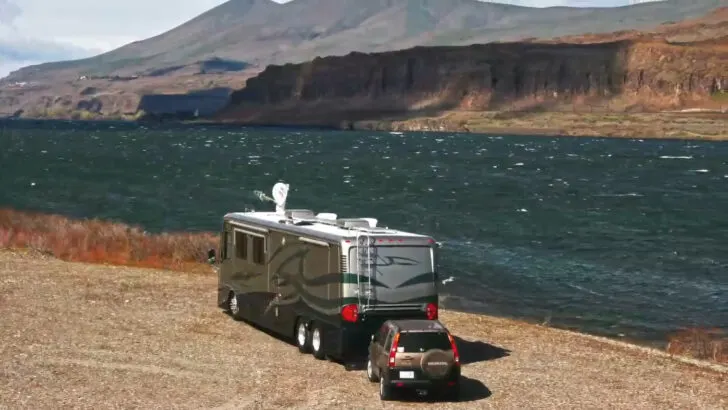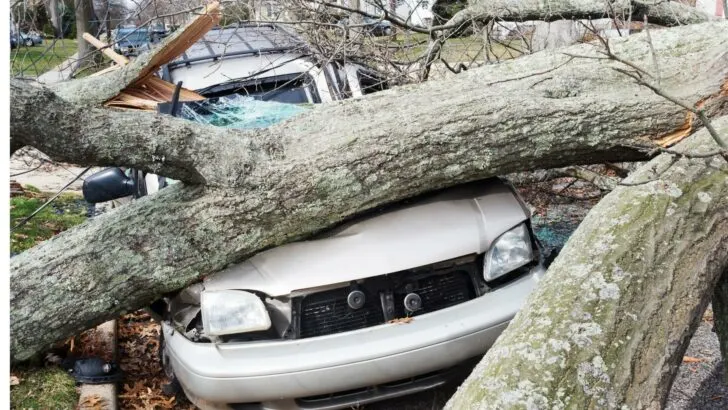Anyone who owns a recreational vehicle needs RV insurance, but full time RVers have additional considerations. Whether you’ve got a motorhome or a travel trailer, if your RV is your primary residence, you may need full time RV insurance.
But what exactly is “full time RV insurance” and how does it differ from a general motorhome or camper policy? Is what you’re looking for essentially a combination of auto insurance and home insurance?
In this post, we’re looking at RV insurance specifically as it relates to full-timers. Now, before you go scrolling on by thinking you’re not a full-time RVer because you don’t live in your rig 24/7/365, we suggest you stick around long enough to find out what specifically qualifies as “full time”. You might be surprised!
Let’s dive into the details!
What Is Full Time RV Insurance?
In our post entitled “What Does RV Insurance Cover?“, we talked about the fact that an RV is a home and a vehicle combined, and thus requires RV-specific insurance. But full time RV insurance is a more comprehensive policy that applies to RV owners who live in their RV for a certain amount of time per year.
RV insurance companies offer this type of comprehensive coverage to RVers who qualify as “full time”. It’s very important to know what this means so that you insure your RV properly.
In general, what you’ll often read is that if you spend six months or more per year traveling in your RV, you qualify for full time RV insurance. But technically, if you spend more than 150 nights per year in your RV, you qualify as someone who needs full time RV insurance.

If you spend 150 nights or more in your RV, you’re considered “full time” by RV insurance standards.
This is a point that is frequently misunderstood.
Many RVers believe that they are only considered full time RVers if their RV is their permanent residence. This isn’t the case. Even if you travel part time in your RV, it’s possible that you qualify as a full time RVer from the perspective of RV insurance companies.
The time to understand the details of your coverage is when you buy your policy – not when you file a claim!
What Does Full Time RV Insurance Cover?
As with car insurance, when you insure a motorhome you want adequate coverage for things like bodily injury, liability, uninsured motorists, etc. But you also want to make sure that your personal belongings are well covered.
A good, comprehensive full time RV insurance policy covers the cost of everything on and inside the RV, in addition to the types of coverage you find in a typical auto or part-time RV/camper policy.
Full time RV insurance protects you whether you’re parked at a campground, in a Walmart parking lot, or at your home or a friend’s home. It also protects you when you’re moving down the road.
So, full time RV insurance should offer typical coverage such as liability (in case you cause damage to another person or their vehicle/property), as well as damage that may occur to your RV (including replacement).
Remember, too, that if your RV is your home, and your home-on-wheels is damaged and can’t be used temporarily while under repair, you may also want coverage that includes hotel costs and/or rental vehicle costs.
Some aspects of your insurance may be offered as optional, but if you took out a loan to buy your RV, and are still paying on that loan, your lender may require that your insurance plan includes all of the coverage offered.
What Is Full Insurance Coverage for Full Time RVers?
Before we get into the specific types of coverage, we want to note that different types of RVs may require different types of insurance, but the designation as “full time” is important regardless of the type of RV you have.
For example, we are full timers living and traveling in a motorhome with which we tow an SUV. So, we need full time RV insurance on our rig and auto insurance on our SUV.

We live full time in our RV and we tow an SUV. So, we need full time RV insurance on the motorhome and auto insurance on the SUV.
Someone who travels in a Class A, B, or C motorhome and doesn’t have a toad will need insurance only on the motorhome.
And finally, those who tow a travel trailer will need RV insurance on the travel trailer and auto insurance on the truck/tow vehicle.
Let’s take a look at the specific types of coverage that are typically offered with a full time RV insurance plan.
Liability – Bodily Injury
This one applies only to motorhomes – RVs that are drivable. (Towable RVs carry the liability coverage of the tow vehicle.) Liability coverage pays for injuries caused by an accident for which you are responsible and is generally required coverage in all states.
Liability – Property Damage
This one also only applies to drivable RVs (motorhomes) as property damage coverage of the tow vehicle’s insurance policy extends to the towable RV (travel trailer, 5th wheel, toy hauler). Property damage liability coverage pays for damage caused to property (including other vehicles) and is also generally required coverage in all states.
Uninsured/Underinsured Motorist
This coverage applies if you’re involved in an accident that is the fault of another driver who is either uninsured or not adequately insured. This would help to pay for damage to your RV as well as injuries to its occupants.
Medical
This covers medical expenses for anyone in your RV who is injured in an accident, regardless of fault.
Collision
Collision coverage pays to repair or replace your RV if it’s damaged in an accident, regardless of who is at fault.
It’s important to note here that this is different from an auto insurance policy in that it may also pay to replace personal belongings inside the RV that are damaged or destroyed due to a collision.
Comprehensive
Comprehensive insurance covers damage to your RV by incidents outside your control, (typically after a deductible is met). These incidents might include damage from such things as vandalism, theft, fire, falling objects, hail storms, other natural disasters (flood, earthquake, hurricane), or striking an animal.

Comprehensive insurance covers your rig in the case of damage from natural occurrences.
Personal Effects Replacement
This coverage pays to replace personal belongings inside your RV. There is generally a coverage limit of up to $5,000 per claim, but some insurance companies will allow the addition of an endorsement for up to $100,000 worth of personal effects replacement.
Total Loss Replacement
This coverage is typically not automatically part of full time RV insurance, but may be offered at an additional cost. Total loss replacement coverage pays to replace your RV if it’s totaled. But the devil is in the details as always, so note that generally speaking if your RV is totaled within the first four years, this coverage should buy you a new comparable RV.
However, were your rig to be totaled in years 5-7, you’d more likely be reimbursed for the actual cash value of the RV or its original purchase price (whichever is higher). After the rig’s 7th year on the road, you’d likely be reimbursed for it’s actual cash value, including depreciation.
These details may vary from policy to policy and from company to company, so be sure to be informed of the details clearly before accepting any insurance policy. With RV prices increasing each year, your coverage amount may not be enough for you to buy a replacement RV!
Roadside Assistance
Roadside assistance coverage kicks into gear if your rig breaks down in any way. Should you need a jump-start, run out of gas, get a flat tire, or require a tow, roadside assistance coverage should provide 24-hour assistance.
With that said, we prefer a separate roadside assistance plan and wouldn’t be without it. Have we needed it? Not often, but when we did need it, we found it to be well worth the cost.
After all, not just any tow service can haul a 43-foot diesel pusher out of quicksand! (Okay, we’re being dramatic – it wasn’t quicksand. But it might as well have been.) See our post on the best RV roadside assistance plans for details.
Gap Insurance
Gap insurance may be offered as a supplemental coverage by some RV insurance companies. The purpose of gap insurance is to cover the gap between what your rig is worth and anything you still owe on it, should it be totaled.
So, if your rig is totaled (or stolen), your gap insurance should pay the difference between the amount of money you get from your collision and comprehensive coverage and the amount you still owe on your RV loan.
What’s the Difference Between Part Time and Full Time RV Insurance?
In the end, not as much as you might think. However, there may be more types of coverage that you opt for if you’re a full timer.
But in reality, all of the types of coverage noted above may be offered to a part time RVer as well. The only real difference is that full time RV insurance wouldn’t include vacation liability coverage, because if you live in your rig full time, you’re not technically vacationing no matter where you go!
How Much Does Full Time RV Insurance Cost?
The cost of full time RV insurance (or any insurance) varies too wildly to speculate on cost, but depending on the coverage elected, the type & age of the RV, your driving history, and where you’re insuring the rig, a full timer’s policy could run anywhere from a few hundred dollars to several thousand dollars per year.
We can tell you that full time RV insurance is more expensive than general RV insurance because we spend more time on the road and in our rigs. From an insurance perspective, the thought is that our RVs are more likely to be damaged for these reasons.
If you're sick of the hassles of finding quality insurance for your RV, look no further than Roamly. Built by RVers, for RVers, Roamly makes the process of getting quotes (online!), buying, and...Show More
If you're sick of the hassles of finding quality insurance for your RV, look no further than Roamly. Built by RVers, for RVers, Roamly makes the process of getting quotes (online!), buying, and managing your RV's insurance policy easy. Need more guidance? No problem, their expert (and friendly) agents are at the ready to help you out, too.
Plus, if you're thinking of using your RV to make money while you're not using it by renting it out? Roamly's got you covered there, too. Their policies allow for that (unlike so many other players in the RV industry).
So, whether you're a part-timer, full-timer, or want to use your RV in a "side hustle" to make some extra money, check out Roamly's insurance offerings.
Show LessGeek Out with Us Every Week
Join our newsletter to learn about all things RV-related. Every week we offer free tips, tricks, product reviews, and more to our online community of RVers. So, whether this is your first time on the road or you’re a seasoned expert, we’d love for you to geek out with us!



Dave hurrie
Saturday 18th of November 2023
We live full time in our 41 ft 5th wheel.It does not move at anytime.We live in a full serviced RV Park.Looking for liability and comprehensive insurance by the year.
TheRVgeeks
Sunday 19th of November 2023
Hi Dave. We'd suggest that reaching out to RV Insurance Direct would be a great place to start: https://www.rvdirectinsurance.com
Trey
Tuesday 5th of September 2023
Hi, Trying to insure a 2012 Forest River DynamaxTrilogy for full time living. Having a hard time. Im in Georgia on the coast. Do you have anyone you can recommend?
TheRVgeeks
Tuesday 5th of September 2023
Hi Trey. Sorry to hear you're having trouble. We'd suggest you try giving any of these places a call to see if they can help (we've used Miller Insurance in the past and always got good service and recommendations from them, and have had Progressive Insurance and was happy with them, too):
Miller RV Insurance: https://www.millerrvinsurance.com Progressive Insurance: https://www.progressive.com/rv-trailer/ RVInsurance.com: https://rvinsurance.comHope one of these can help you!
Shannon payne
Sunday 19th of February 2023
What about extra personal property insurance? Because living full time the insurance agencies only cover Certain things up to a limit. Doesn’t cover much. How do you get all your stuff covered? Like a home owners ( without owning a home) ????
Jordan
Tuesday 20th of September 2022
Hands down the BEST explanation of RV insurance options and recommendations I have ever read! I've been full-timing for nearly a year and learned a ton. Thank you for sharing!
TheRVgeeks
Wednesday 21st of September 2022
Wow! Thanks so much for the kind words, Jordan! You've made our day!